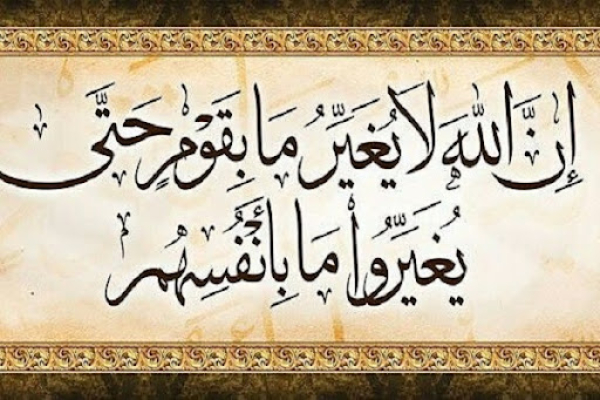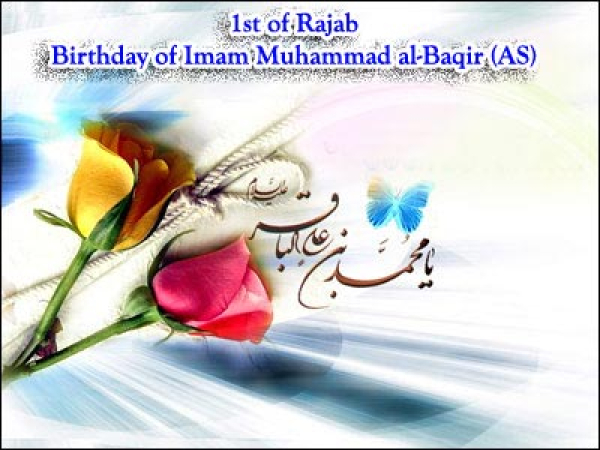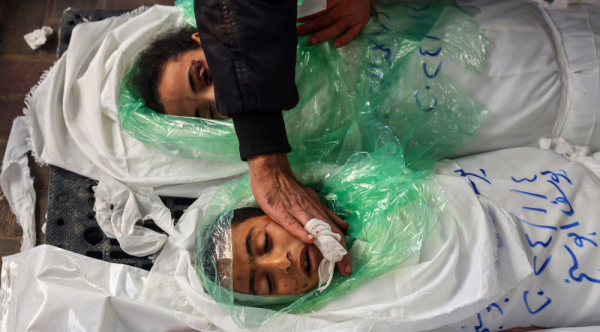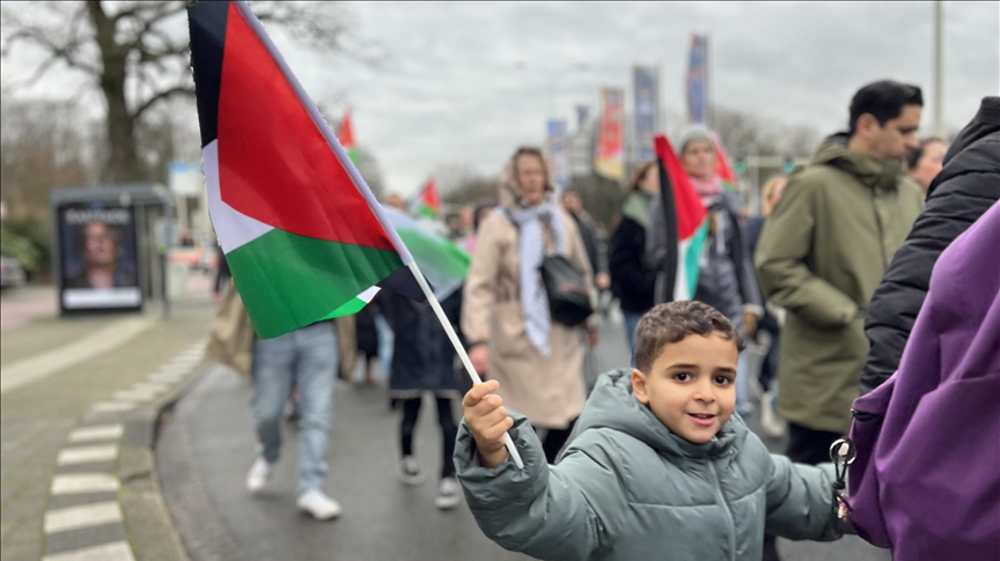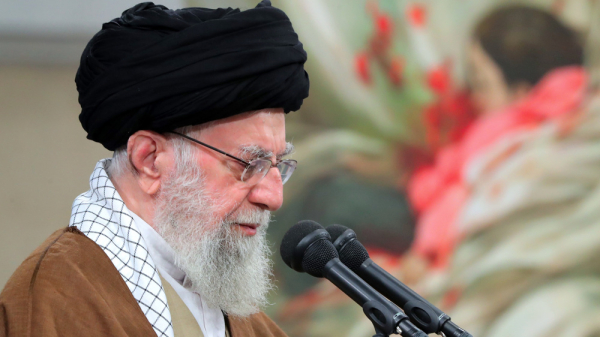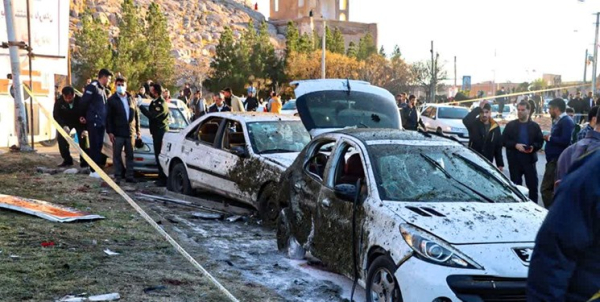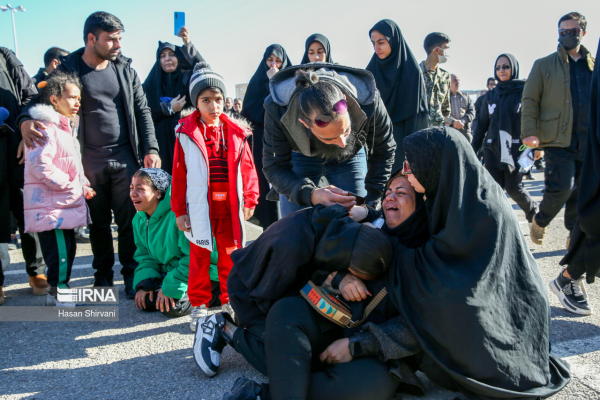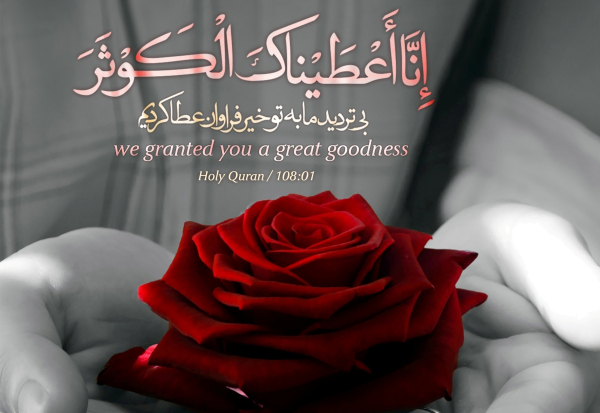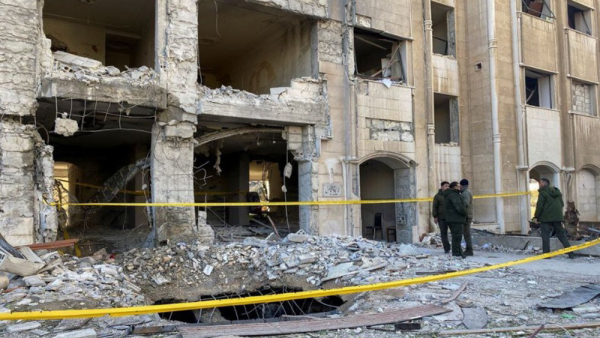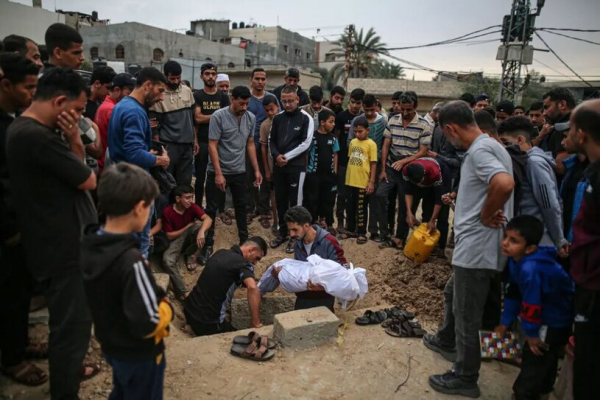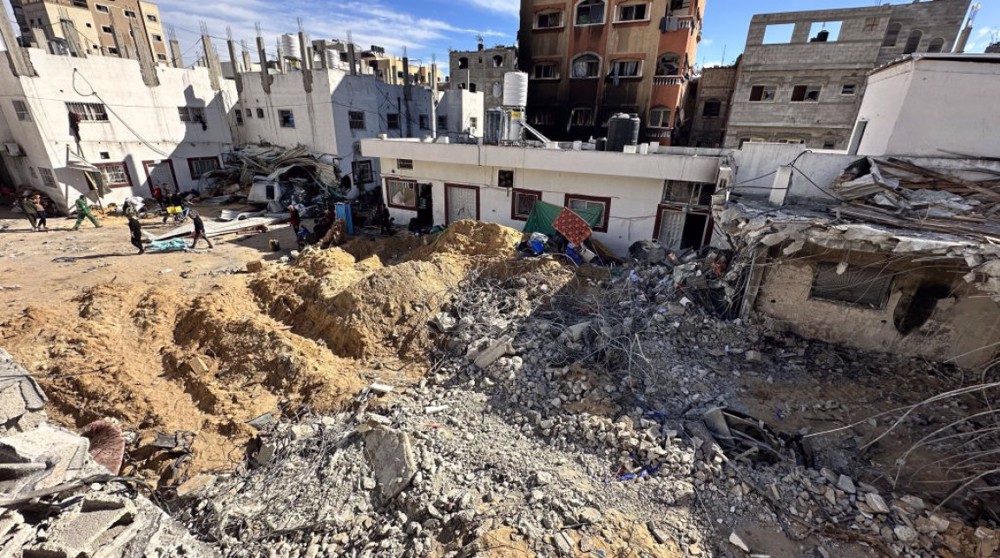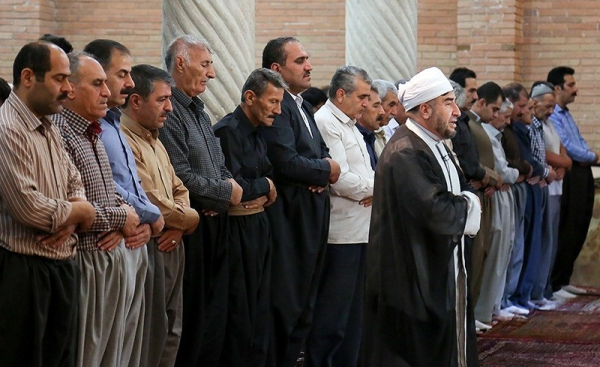zarezadeh
Surely Allah does not change the condition of a people until they change their own condition
إِنَّ اللهَ لاَ یُغَیِّرُ مَا بِقَوْم حَتَّى یُغَیِّرُوا مَا بِأَنفُسِهِمْ (۱۱-رعد)
The complete verse is:
For his sake there are angels following one another, before him and behind him, who guard him by Allah's commandment; surely Allah does not change the condition of a people until they change their own condition; and when Allah intends evil to a people, there is no averting it, and besides Him they have no protector.
Unpleasant things happen to man that may harm him, and God has told the guardian angels for each specific person to protect him with God's permission, and indeed God does not change His blessings to any nation as long as they change their conditions. They don't give, and when they change what is related to humans themselves, God also changes, that is, man himself causes divine blessings to not reach him, and when He wills, calamity will come to them, so there is no one who can prevent it, and it is not for them any Nasser and Hafez.
The Birth Anniversary Of Imam Mohammad Baqir (AS)
Imam al-Baqir (a) was born on Friday Rajab 1, 57/May 10, 677 in Medina. Some have reported his birth to have been on Safar 3/December 16 of the same year (57/676). He was a small child and present in the Battle of Karbala.
Muḥammad b. ʿAlī b. al-Ḥusayn b. ʿAlī b. Abī Ṭālib (Arabic: محمد بن علي بن حسین بن علي بن أبي طالب) known as Imām al-Bāqir (a) and Bāqir al-'Ulūm, was the fifth Imam of the Shi'a, whose period of Imamate lasted nineteen years.
Imam al-Baqir (a) made a great scientific movement that reached its peak at the time of his son Imam al-Sadiq (a). His narrations in religion, conduct of the Prophet (s), Qur'an sciences, moral conduct, and manner are more than what is remained from the children of Imam al-Hasan (a) and Imam al-Husayn (a). Thus, during his imamate, a great step was taken towards the organization of Shi'i thought in different fields including ethics, jurisprudence, theology, exegesis, etc. According to historical sources he was present at Battle of Karbala as a child.
The pure blood of the Palestinian people in Gaza will hasten the downfall of Israel
The chief commander of the Iranian Army says Israel is shedding the blood of innocent Palestinians to make up for its “humiliating defeat” in the Gaza war, warning that the atrocities will only speed up the regime’s demise.
Major General Abdolrahim Mousavi made the remarks on Tuesday, as 95 days of bloody aggression against the besieged Gaza Strip has brought no success for the occupying entity.
“Under the support of the US and other Western countries, the illegitimate Zionist regime is taking revenge on unarmed and defenseless children, women and civilians for its heavy and historic defeat at the hands of Hamas,” he said, referring to the Gaza-based Palestinian resistance group.
“Of course, nothing will make up for its (Israel’s) humiliating defeat. The pure blood [of the Palestinian people] will hasten the downfall of the Zionist apartheid regime.”
Israel waged the genocidal war on the Gaza Strip on October 7 after Hamas carried out an unprecedented operation against the usurping entity in retaliation for its intensified atrocities against the Palestinian people.
So far, the Tel Aviv regime has killed at least 23,084 Palestinians, mostly women and children, and injured 58,926 others.
Thousands more are also missing and presumed dead under the rubble in the Gaza Strip, which is under “complete siege” by Israel.
Kerman carnage committed by those ‘not capable of fighting’
Referring to the recent terrorist bomb attacks in the Iranian city of Kerman, Mousavi said it was carried out by “the black-hearted who are not capable of fighting in the field.”
On Wednesday, 91 people were killed and hundreds injured in two explosions near the burial site of Iran’s late anti-terror commander Lieutenant General Qassem Soleimani during a ceremony marking the fourth anniversary of his assassination by the US. The Daesh terrorist group claimed responsibility for the deadly bombings.
Press TV’s website
Israel is not the winner of this war
Leader of the Islamic Revolution Ayatollah Seyyed Ali Khamenei says the resistance of Palestinian people in the Gaza Strip has frustrated the United States and Israel.
The Leader said that a limited number of people in a limited area of land called the Gaza Strip managed to frustrate the United States and its vassal the Zionist regime.
Also, nearly a hundred people have been killed in the terrorist incident in Kerman in Iran, which is known to have been planned by Israel and America. Shedding so much blood and causing these murders does not go unanswered. The lovers of Israel think that Israel is victorious, but Israel has become weak from so much resistance. One day Israel will be completely destroyed.
terrorists involved in Kerman attacks arrested
Iran’s Intelligence Ministry has announced the arrest of 11 terrorists suspected of involvement in the January 3 bomb attacks in the southeastern city of Kerman.
In its Friday statement, the ministry said the security apparatus detected the initial signs of the role of the Daesh Takfiri terrorist group in the bombings right after the tragic acts of terror were carried out.
According to the statement, two terrorists conducted the bomb attacks, one with a Tajik nationality. There has been no precise information yet about the identity of the second.
The ministry said security forces detained two terrorists on Thursday for providing support to the bombers in their hideout in Kerman’s suburbs.
Nine members of the terrorists’ support team have also been identified and arrested across six provinces of Iran, the ministry said.
Operation equipment has also been discovered in the hideouts of the terrorists, including two explosive vests, two remote control devices, detonators, thousands of bullets used in the explosive vests, wiring prepared for the vests and quantities of explosive raw materials, the ministry said.
The terrorist explosions were carried out near the burial site of Iran’s late anti-terror commander Lieutenant General Qassem Soleimani during a ceremony marking the fourth anniversary of his martyrdom. The blasts left 89 people, including 76 Iranians and 13 Afghans, dead and wounded 286, some of them in critical condition.
Daesh claimed responsibility for the heinous act in a statement posted on their affiliate Telegram channels. It said two of its members had detonated their explosive belts among the crowd.
Press TV’s website
America, Israel and all the enemies of Islam are responsible for the terrorist incident in Kerman
The city of Kerman is once again suffering a great sadness, now after the martyrdom of the city commander, this time the cowardly enemy killed the supporters of Haj Qasim and martyred nearly 100 people. Many children are among the martyrs. Many families are mourned. This incident was a terrorist incident that happened on January 3, 2024.
These days, the heart of Kerman is suffering, in Kerman, the pictures of the martyrs are in every alley and street, and the sound of crying is heard.
Anger squeezes Kerman's throat, behind which is the will to continue the path of martyrs and revenge.
Kerman, which was the birthplace of martyrdom, has now become the place of martyrdom in Iran. Today, together with the families of the martyrs, their hearts beat in the Martyrs' Garden, a garden where dozens of people from both cities and provinces are being buried.
Now the Kermans are more determined to continue the path of martyrs and seek martyrdom because blood has been spilled on the ground for which the enemies of Islam, America and Israel, must answer.
The bloodshed of America and Israel came out of the hands of the mindless agents of ISIS so that the people of Kermani know that they have chosen the right path.
This issue was proven in Kerman, now we people of Kerman prove that we are the nation of Imam Hossein like our commander and we will continue the path of martyrdom.
The enemies should know that the path of the martyrs will continue.
Surely We have given you Kausar
بسْمِ اللَّهِ الرَّحْمَٰنِ الرَّحِيمِ إِنَّا أَعْطَيْنَاكَ الْكَوْثَرَ(سوره کوثر: 1)
The name of Surah Kauthar is derived from the first verse, and Kauthar means abundant good things.
According to several narrations from Shia and Sunni, As ibn Wael, the father of Amr As, who was one of the great polytheists of Mecca, after the sons of the Prophet passed away and he had no more sons, because of taunts and sarcasm, said the holy prophet is without posterity.
In order to comfort the Prophet's heart and to answer this inappropriate speech, God revealed Surah Kauthar and announced the failure of the enemies and the durability and survival of the Prophet's generation among Fatima AlZahra(pbuh) generation. This verse is about Hazrat Zahra, because the generation of the Prophet is from the children of Hazrat Zahra and this generation continues and does not disappear.
Israel attacks Syria with missiles, artillery in fresh acts of aggression
The Israeli military has carried out two separate strikes against targets in Syria amid its bloody onslaught against Palestinians in the besieged Gaza Strip.
Syria’s official SANA news agency, citing an unnamed military source, reported that the Israeli enemy launched an aerial attack from the direction of the occupied Golan Heights at around 4:35 a.m. local time (0135 GMT) on Tuesday, targeting some sites on the outskirts of the capital Damascus.
The source added that there were no injuries in the strike, but there were material losses.
Another military official told Russia’s Arabic-language RT Arabic television news network that Syrian air defenses intercepted and shot down most of the incoming Israeli missiles.
The development came only a few hours after Israeli artillery units shelled areas in Syria’s southwestern province of Dara’a.
The Israeli army stated in a statement that the attack was in response to several rockets fired from southern Syria into the Golan Heights.
Israel waged the bloody war on Gaza on October 7 after the Palestinian Hamas resistance movement launched Operation al-Aqsa Storm in the occupied territories in retaliation for the Tel Aviv regime’s incessant crimes against Palestinians in the occupied West Bank.Since the start of the aggression, the Tel Aviv regime has killed 21,978 Palestinians, most of them women and children, and injured some 57,700 others.
It has also imposed a “complete siege” on the coastal sliver, cutting off fuel, electricity, food and water to the more than two million Palestinians living there.
Israel frequently targets military positions inside Syria, especially those of resistance fighters, who have played a key role in helping the Syrian army in its fight against foreign-backed terrorists.
Press TV’s website
How Israeli regime mutilates and steals organs from dead bodies of Palestinians
By Humaira Ahad
“His eyes sank inside his skull as if he did not have any muscles atrophied, and his skin peeled off easily. It was difficult to identify him, except that I am his father and I know him well.”
These were the words of Muhammad Elayaan, father of Bahaa Elayaan, when the body of his 22-year-old son was released in 2016 by the Israeli regime after being kept in the refrigerator for 325 days.
To take possession of Elayaan’s body, the bereaved family had to pay a ransom of 20,000 Israeli shekels ($5,292) and ensure that it was buried only in a cemetery chosen by the Israeli regime police with only two dozen people in attendance for the funeral rites.
Muhammad Elayaan said his son’s lifeless body was severely disfigured due to several months spent frozen in a morgue controlled by the regime.
More than 130 bodies of Palestinians killed since 2015 have been kept by the occupying regime in morgue fridges. Worse, it has also been found involved in harvesting their organs.
Amid the genocidal war that has killed more than 21,000 people in Gaza since October 7, the latest case of the Israeli regime’s criminal practice of mutilating Palestinian corpses has come to the fore.
On December 26, the authorities in Gaza said the regime had again mutilated and harvested the organs of Palestinians, most of them youth, killed by the Israeli army during recent ground aggression.
Condemning the crime, authorities in Gaza said the regime delivered the bodies of about 80 Palestinians in the city of Rafah, which were “in a state of decomposition and difficult to recognize.”
These bodies were “from different areas” in the besieged coastal strip, the authorities noted, adding that it was clear that the regime had “tampered with these bodies.”
“Many cases revealed that organs were stolen from the bodies of these martyrs,” read the statement by the Government Media Office in Gaza.
“What the enemy did can only be described as a war crime, a heinous crime, and a blatant violation of the sanctity and dignity of the dead.”
The regime refused to reveal the identities of the bodies and did not mention locations where they were kidnapped, held, murdered and mutilated, according to Gaza authorities.
“Their barbarism and moral decline are confirmed in their aggression against our people, their assault on the bodies of our righteous martyrs, and the exhumation of their graves,” the statement noted.
These bodies “arrived inside a container, some intact, while others were in pieces, and some others had decomposed.”
Targeting cemeteries, stealing bodies
As per a report published earlier this month by Euro-Med Human Rights Monitor, a Geneva-based human rights group, the Israeli army has repeatedly targeted several cemeteries in the Gaza Strip, leading to widespread destruction. It has vandalized graves, and also stolen dead bodies.
The group, which has widely documented war crimes by the Israeli regime since October 7, said such practices by the Israeli army have been common throughout this war, adding that graves in Jabalia, north Gaza, were recently dug up and emptied.
“Israel’s army has targeted the majority of cemeteries in the Gaza Strip, including Al-Falujah cemetery in the northern Gaza Strip, Ali bin Marwan, Sheikh Radwan, Al-Shuhada, and Sheikh Shaaban cemeteries, in addition to St. Porphyrius Church cemetery in Gaza City and Al-Shuhada cemetery in the northern town of Beit Lahia, destroying dozens of graves in utter disregard for the sanctity of the dead,” it said.
“Large holes have been created inside these cemeteries as a result of frequent Israeli attacks, engulfing dozens of graves. The remains of some dead bodies have been scattered or disappeared, while dozens of graves remain seriously damaged.”
The Israeli forces also dug up and confiscated bodies from a mass grave in one of the al-Shifa Medical Complex’s courtyards in mid-November.
Euro-Med claimed that it has documented Israeli forces confiscating dozens of dead bodies from the al-Shifa and Indonesian hospitals in northern Gaza, besides others in the south.
As evidence of organ theft, Palestinian doctors reportedly found vital organs, such as the liver, kidney and heart, alongside the cochlea and cornea, missing in the dead bodies.
Citing eyewitness reports, the rights group said a number of Palestinian men were rounded up earlier this month by the regime forces from northern Gaza, stripped naked, blindfolded, lined up in a queue, and humiliated before being taken in trucks to an unknown location and finally executed.
While dozens of corpses were handed over to the International Committee of the Red Cross (ICRC), the regime's army continues to hold the bodies of dozens of Palestinians killed by the regime forces.
Given the international complicity in Israeli war crimes, Euro-Med emphasized that Israel has not spared even the dead in its latest genocidal war on the Gaza Strip, which started on October 7.
Rule 115 of customary international humanitarian law states that “the dead must be disposed of in a respectful manner and their graves respected and properly maintained.”
Article (130) of the Geneva Convention of 1949 also states that “graves must be respected, properly maintained, and marked in such a way that they can always be recognized.”
Israel, according to rights groups, has been systematically violating the sanctity of the dead and cemeteries in flagrant violation of the principles of international humanitarian law and the rules of war in relation to the protection of cemeteries during armed conflicts.
Israel’s blotted history of organ theft
Israeli medic Meira Weiss, in her book “Over Their Dead Bodies”, states that organs were taken from dead Palestinians between 1996 and 2002 and used in medical research at Israeli universities and transplanted into Israeli patients.
"In the first intifada, the army effectively allowed the institute to extract organs from Palestinians under a military procedure that required dissecting the bodies of Palestinian prisoners. The autopsy procedure was accompanied by the removal of organs used by the Israeli skin bank, established in 1985 to treat burns suffered by Israeli soldiers," Weiss writes.
A 2008 report said Israel was the biggest hub for the illegal global trade in human organs.
In a report that shocked the world in 2009, Israeli pathologists admitted to harvesting organs from dead Palestinians without the consent of their families
The truth was exposed in an interview when Dr. Yehuda Hiss, former head of the Abu Kabir Forensic Institute near Tel Aviv, said that specialists at the institute harvested skin, corneas, heart valves and bones from the bodies of Palestinians often without requisite permission from relatives.
"We started to harvest corneas ... whatever was done was highly informal. No permission was asked from the family,” said the former chief pathologist.
“In some cases, glue was used to close eyelids to hide missing corneas.”
Many eyewitnesses said that the eyelids of young Palestinians who disappeared mysteriously with their bodies later sent to their villages would be glued shut to prevent the removal of corneas from being found out.
An Israeli television report in 2014 included confessions from high-ranking regime officials that skin was taken from the bodies of dead Palestinians and African workers to treat Israelis, mainly soldiers with burn injuries.
The director of the Israeli Skin Bank revealed Israel’s reserve of human skin reached 17 square meters.
Experts claim that it is the largest in the world. The number is also strange given the fact that Israel ranks third in its population's refusal to donate organs, due to its Jewish religious beliefs.
According to Euro-Med Monitor, Israel is one of the “world’s biggest hubs for the illegal trade of human organs under the pretext of “security deterrence”.
Neocannabalism of Israeli regime
In 2017, the regime’s cabinet issued a resolution stating that the bodies of Palestinians who belonged to Hamas, or those who committed particularly dramatic attacks against Israelis should be withheld.
This was primarily done to gain leverage in future negotiations.
In continuation of the usual practice of the regime, the law extended to include anyone and presently Israel can withhold the body of any Palestinian without any specific reason.
In a July 2020 report, the UN special rapporteur on human rights, Michael Lynk, denounced the Israeli policy of withholding bodies of slain Palestinians as a form of collective punishment, and a violation of international law.
Since 2015, the bodies of Palestinians have been held in refrigerators at the Abu Kabir Forensic Institute. According to reports, almost a dozen of the bodies are of children under the age of 18.
The desperation of the families to bid last farewell to their loved ones is cashed by the regime and families are forced to provide monetary deposits to Israeli authorities as financial guarantees for adhering to posthumous restrictions. These restrictions include commitments not to conduct an autopsy, admit the returned corpses to hospitals, and have a minimal funeral.
In an attempt to demonstrate power by denying dignity to the dead, the regime not only deprives families of a healing process but also tries to manifest its control by punishing their kith and kin.
Press TV’s website
What is the condition of Sunnis and religious minorities in Iran?
In today's Iranian society, Sunnis are the largest religious group after Shiites. Available estimates show that the Sunni religious population of Iran is about eight to 10% of the country's total population which is concentrated or dispersed in the provinces of Sistan and Baluchistan, Kurdistan, Kermanshah, West Azerbaijan, North Khorasan, Razavi, and South, Golestan, Gilan, Ardabil, Hormozgan, Bushehr, Fars, Kerman, Mazandaran, East AzarbaijanZanjan, as well as Tehran and Alborz.
Among the four Sunni schools of thought, Hanafi, Shafi'i, Hanbali and Maliki, the three schools of Hanafi, Shafi'i and, in a more limited way, Hanbali have followers in all corners of Iran. Hanafis are based in Sistan and Baluchistan province, Golestan and North Khorasan, Razavi Khorasan and South Khorasan, Hormozgan and to a lesser extent in Kerman, Mazandaran and Ardabil. Sunni Shafi'is are generally based in the provinces of Kurdistan, West Azerbaijan, Kermanshah, Gilan, Ardabil, Fars, Bushehr, Hormozgan and to a lesser extent in East Azerbaijan. In Zanjan province, there are also some Sunnis who are probably of the Shafi'i religion. A small group of Sunni Iranians are also Hanbali, who are based in the south of the country.
Ahl-e-Sunnat Azerbaijan (provinces: Ardabil, East Azerbaijan, Zanjan and West Azerbaijan)
- Sunni Kurdistan (provinces: Kurdistan, Kermanshah and Kurdish regions of West Azerbaijan)
- Sunni Khorasan (provinces: Razavi Khorasan, North Khorasan and South Khorasan)
- Southern Sunnis (provinces: Fars, Hormozgan and Bushehr)
- Sunnis of Balochistan (provinces: Sistan and Baluchistan and the Baloch areas of Kerman, Hormozgan and South Khorasan)
- Sunni Turkmen of the Sahara (provinces: Golestan, North Khorasan and Mazandaran)
- Sunni Talash (provinces: Ardabil and Gilan)
- Ahl-e-Sunnah Center (provinces: Tehran and Alborz)
After the victory of the Islamic Revolution in February 1979, in the Constitution of the Islamic Republic of Iran, religious minorities were limited to the four religions of Sunnis and Zaidi Shiites, and the known religious minorities were Zoroastrian, Kilimian and Christian (Armenian and Assyrian).
Also, these minorities are respected within the limits of the law, they are free to perform their religious ceremonies, and they are allowed to act according to their religion in their personal circumstances.
According to Article 64 of the Constitution and its amendment, each of the official religious minorities can have a representative in the Parliament.
In some principles of the constitution, there are general interpretations that include religious minorities, such as: the need to provide the basis for public participation of the people in determining their own destiny and providing judicial security for all people (principle 3), protection of the law for all people and equality of rights People (principles 19 and 20), the right to choose a suitable job (principle 28), the right to sue and choose a lawyer (principles 34 and 35).
Therefore, it can be concluded that the constitution of the Islamic Republic has specified more freedoms and rights for religious minorities than the government before revolution.
